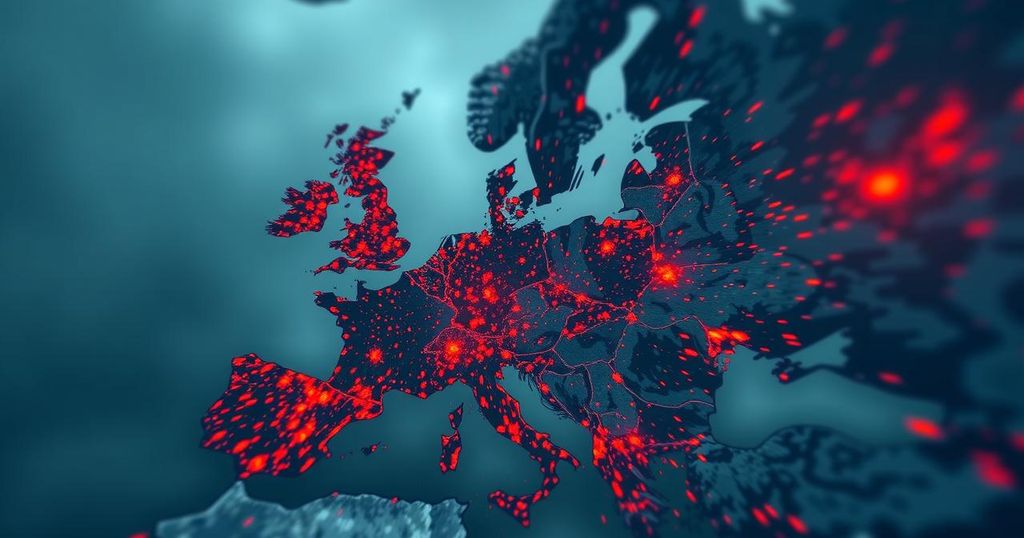Deepfakes and Cyber Attacks: The Paris 2024 Olympics as a Digital Warfare Nexus
The Paris 2024 Olympics faced significant cybersecurity threats, marked by over 140 reported cyber-attacks, amid rising geopolitical tensions and the increasing use of AI in cyber warfare. Deepfake technology was notably employed in disinformation campaigns, targeting athletes and the event’s reputation. Proactive measures, including infrastructure audits and staff training, are essential to safeguard against future cyber threats.
The Paris 2024 Olympics represented an unprecedented target for cybersecurity threats, with French authorities reporting over 140 cyber-attacks during the event. As the most technologically advanced Olympics to date, it showcased cutting-edge digital infrastructure, making it a prime target for malicious actors. This uptick in digital aggressions corresponded with global cyber-warfare trends and the rapid evolution of artificial intelligence (AI) technology. AI has emerged as a significant player in the realm of cybersecurity, offering enhanced capabilities for detecting threats. However, this same technology has been exploited by cybercriminals to evolve their attack methods. In 2023, AI-enhanced ransomware incidents rose by 30%, posing a severe risk to organizations, while AI tools improved the identification of system vulnerabilities by 25%. The irony lies in AI’s dual role: a powerful tool against cyber threats yet simultaneously a vehicle for augmenting them. During the Olympics, AI-generated deepfake content played a critical role in influence campaigns aimed at undermining the event. This included disseminating fabricated audio and video materials purporting to show false game outcomes and creating fake news related to athletes and officials. These deepfake efforts exploited existing geopolitical tensions, notably influenced by the ongoing Russia-Ukraine conflict. Hacktivism intensified amid such geopolitical strife, with groups linked to Russia, like Storm-1679, leveraging social media to disseminate disinformation regarding the Olympics. A notable instance included a documentary titled “Olympics Have Fallen,” featuring an impersonation of Tom Cruise’s voice to critique the International Olympic Committee — a stark example of the new heights of psychological warfare, blurring the lines between reality and fiction. Furthermore, Russian-affiliated threat actors released fabricated warnings through video news releases from intelligence agencies, further tarnishing the Games’ reputation and heightening expectations of violence. The cybersecurity implications of this disinformation campaign emphasize the need for proactive measures in safeguarding large scale events like the Olympics. To mitigate risks, organizations must conduct thorough audits of their IT infrastructure, ensuring vulnerabilities are addressed. Staff training is equally critical in recognizing and responding to cyber threats. Secure communications and data protection must also be prioritized, with practices such as avoiding public Wi-Fi and encrypting internet traffic recommended to enhance security measures. Ultimately, the events surrounding the Paris 2024 Olympics shed light on the dual-edged nature of AI within cybersecurity. While offering advanced defensive tools, the potential for AI to facilitate disinformation campaigns presents ongoing challenges. To resist evolving threats, organizations must constantly adapt their cybersecurity strategies while keeping abreast of global events affecting their operations.
The significance of the Paris 2024 Olympics extends beyond athletic competition; they mark a pivotal moment in the intersection of sports and cybersecurity. As the most connected Olympic Games in history, the event becomes a focal point for digital threats, reflecting broader trends in international cybersecurity challenges. The rise of AI technologies has introduced new dimensions to both offensive and defensive cyber operations, complicating the security landscape for high-profile global events.
The Paris 2024 Olympics epitomize the evolving landscape of cybersecurity threats where innovative technology meets sophisticated attack vectors. The blend of AI’s benefits in enhancing cybersecurity and the risks posed by its misuse underscores the urgent need for comprehensive strategies against emerging threats. As organizations continue to adapt to these challenges, the lessons learned from the Paris Games will be instrumental in shaping future approaches to cybersecurity for major global events.
Original Source: techinformed.com







Post Comment